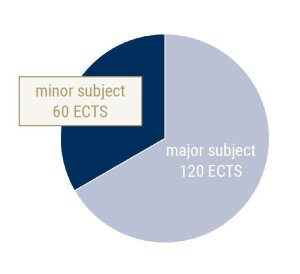
- Degree
- Bachelor of Arts
- Supplement to degree
- minor in a multi-subject bachelor’s programme
- Admission restriction
- without admission restriction (without NC)
- Duration
- 6 Semesters
- Credits/ECTS
- 60
- Teaching language
- German
- Tuition fee
- None
- Semester contribution
- € 305,05
- Start of studies
- Winter semester
- Part-time possible
- Yes
- Institutions
- Faculty of Arts
- Institute of Near Eastern Studies, Indo-European Studies and the Archaeology of Prehistory to the Early Middle Ages
Programme content
The subject Middle Eastern Languages and Cultures with a focus on Ancient Near Eastern Studies is designed as a philologically based, interdisciplinary regional science. It provides students with a broad knowledge of the languages and cultures of the age of the Near East, i.e. the areas of ancient Mesopotamia (today Iraq and Syria), the Levant (today Lebanon and Syria) and Asia Minor (today Turkey). The temporal and content-related framework is essentially determined by the cuneiform script that was used in the Near East from the end of the 4th millennium BC until its disappearance in the first century AD
The basis of the programme is intensive language training, which opens up unbiased access to the sources of Ancient Near Eastern History. The focus is on the cuneiform Akkadian and Sumerian languages, which had a particular influence on Mesopotamian cultures. As part of the compulsory elective programme, students can also learn other modern and ancient Near Eastern languages from the institute's extensive range of languages.
Structure
Multi-subject bachelor’s programme
Picture: Sophie BartholomeThe Bachelor's degree is the first professional qualification. The standard period of study|regular programme length is six semesters in total, during which various forms of courses (e.g. seminars, lectures or tutorials) are offered for the individual modules.
A multi-subject Bachelor's degree consists of a major subject with 120 credit points (abbreviation: LP / 1 LP = 30 hours of attendance, preparation and follow-up work|follow-up activity, coursework and examinations) and a supplementary subject with 60 LP.
Four compulsory modules totalling 40 CP form the focus of the Ancient Oriental Studies supplementary subject, which, in addition to Akkadian and Sumerian, deal with the History and culture of the Ancient Orient.
The compulsory elective area of the degree programme totalling 20 CP opens up the opportunity to develop an individual profile by choosing a modern Near Eastern language and registering for modules from the related disciplines of Classical Studies and Ancient Studies, Arabic Studies, Indo-European Studies, Caucasian Studies and Theology. Ancient Near Eastern Studies offers an introduction to Egyptology and an introduction to Near Eastern Archaeology as required elective modules to complement the focus.
How might your degree programme shape up?
The following table shows you an example of a possible programme structure for the supplementary subject »Languages and Cultures of the Near East with a focus on Ancient Near Eastern Studies«:
| 1st semester | 2nd semester | 3rd semester | 4th semester | 5th semester | 6th semester |
| Introduction to Ancient Oriental Studies (20 CP) |
Akkadian reading (5 CP) |
Introduction to Sumerian (5 CP) |
|||
| History and Culture of the Ancient Orient (10 CP) |
Required elective modules* (20 CP) | ||||
Abbreviations: CP = credit points (ECTS)|ECTS credits
* You can choose from modules in modern languages (e.g. Arabic) and other modules from the subjects of Ancient Oriental Studies, Arabic Studies, Theology, Indo-European Studies, Classical Studies and Caucasian Studies.
You can find more detailed information in the module catalogue for the degree programmeExternal link.
Why study in Jena?
- Focus: The specialisations represented in Jena (history of writing, language and law, especially of the 1st millennium BC) as well as the compulsory combination of age and new languages of the Near East (especially Arabic) are unique in Germany in this combination.
- Good requirements: With the Hilprecht Collection - the largest university-owned cuneiform collection in Germany - the study location Jena offers unique requirements for gaining experience and knowledge regarding the scientific handling of cuneiform artefacts. With the practical collection and museum component of the degree programme, students lay important foundations for their future academic and occupation.
- Individual supervision: As a so-called minor subject, Ancient Near Eastern Studies offers students on the degree programme particularly close and individual supervision thanks to small group sizes.
- Extensive tender : With the Thuringian University and State LibraryExternal link (ThULB) and the Department of Digital Culture and Collection Management, the Friedrich Schiller University Jena has an excellent information and research infrastructure in the subject area|field of Humanities.
- Unlimited possibilities: Experience internationality! The university attracts students and academics from all over the world with its attractive conditions and characterises Jena as a future-oriented and cosmopolitan city - ideal requirements for prospective international studentsmp4, 57 mb · de.
- Adventures abroad: You can easily fulfil your dream of a semester abroad de. Our university has a worldwide network of partner universities.
What can you do after your studies?
Career opportunities:
As an academic degree programme, the Middle Eastern Languages and Cultures with a focus on Ancient Near Eastern Studies at the Friedrich Schiller University Jena forms the basis of an academic career and prepares students specifically for the consecutive master's programme in Middle Eastern Languages and Cultures as well as a subsequent doctorate in Ancient Near Eastern Studies.
Thanks to the extensive practical component, the opportunity to develop a profile as part of the compulsory elective area (including modern languages) and the combination with another subject as part of the multiple bachelor's degree, the degree programme also opens up a wide range of other career paths, depending on the individual focus. The degree programme qualifies students for the following professional fields in particular:
- Adult education
- education management
- journalism
- Tourism (study trips)
- Libraries and archives
- Publishing
- Public relations
What are we looking for in prospective students?
- Interest in language and History
- Scientific curiosity
- Intercultural openness
- Enjoyment of research work
- Interest in archaeology
Admission requirements
-
University entrance qualification
A university entrance qualification, such as a general secondary school leaving certificate, is required for admission onto the study programme.
More information on university entrance qualifications can be found here.
-
Language requirements
English (A2); proof by registration for module AO 320t at the latest
Contacts
Room 308
Zwätzengasse 4
07743 Jena
Google Maps site planExternal link
Opening hours:
nach Vereinbarung
Room 307
Zwätzengasse 4
07743 Jena
Google Maps site planExternal link
Bachstraße 18k
07743 Jena
Telephone hours:
Mondays and Fridays (9:00 – 11:00)
Wednesdays (13:00 – 15:00)
The ASPA is primarily responsible for students in the Faculty of Social and Behavioural Sciences, the Faculty of Arts and Humanities, and the Faculty of Theology.
Postal address:
Akademisches Studien- und Prüfungsamt
Fürstengraben 1
07743 Jena
Zwätzengasse 4
07743 Jena
University Main Building / SSZ
Fürstengraben 1
07743 Jena
Google Maps site planExternal link
Office hours:
We offer consultations in person, by telephone, and via Zoom. You can make an appointment by calling us on +49 3641 9-411111 (Mondays to Fridays from 9:00 to 11:00) or outside these office hours on +49 3641 9-411200. You can also use our remote help desk.
Consultation hours:
Mondays, Tuesdays, Thursdays and Fridays (9:00 to 12:20), Tuesdays (14:00 to 18:00), and Wednesdays and Thursdays (14:00 to 16:00).
Video chat: To the video chat – Zoom Videochat ZeitenMondays to Fridays (12:30 to 13:00) Password ZSB2020 Data protection informationpdf, 101 kb
University Main Building, Room E065
Fürstengraben 1
07743 Jena
Google Maps site planExternal link
Opening hours:
Information Desk (UHG; Room E0.65)
Mondays (10:00 – 12:00)
Tuesdays (13:00 – 15:00)
Wednesdays (10:00 – 12:00)
Thursdays (13:00 – 15:00)
Fridays (10:00 – 12:00)
You can also use our remote help desk at
www.uni-jena.de/service-ssz
or send us your enquiries by post.
Telephone hours:
Mondays to Fridays
(9:00 – 11:00)
Postal address:
Friedrich-Schiller-Universität Jena
Studierenden-Service-Zentrum
07737 Jena
University Main Building
Fürstengraben 1
07743 Jena
Google Maps site planExternal link
